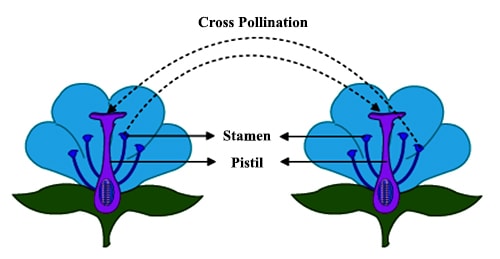When pollen grains are transferred from the anther to the stigma of flowers of the same species of a separate plant is called cross-pollination. It is the transfer of pollen from the anther of one flower to the stigma of another flower on a different individual of the same species. In cross-pollination the genotypes of two plants have some variation, in nature, cross-pollination occurs in most of the plants.
Pollination occurs between two flowers having a difference in genotype. Thus the seed that is produced from this has variation in genotype. Therefore the new plant grown from this seed is not identical to the mother plant. New variation may produce even a new species. Due to combinations of the most plants, their adaptability increases so natural calamity (disaster) can’t extinct them easily. Examples of cross-pollinated plants are Paddy, Wheat, Maize, Mustard, Silk Cotton (Shimul), Madar, Mango, etc.

Self-pollination occurs in flowers where the stamen and carpel mature at the same time, and are positioned so that the pollen can land on the flower’s stigma. It is always dependant on another agent to cause the transfer of pollen. This method of pollination does not necessitate an outlay from the plant to provide nectar and pollen as food for pollinators. The agents of pollination include birds, animals, water, wind, and insects.
Merits of cross-pollination:
- A combination of new character occurs. It is helpful to the competition of the plant as it introduces new genes into the lineage as a result of the fertilization between hereditarily different gametes
- New varieties may be originated, they are eliminated as a result of genetic recombination.
- Seeds become more viable and more tolerant. The seeds produced as a result of cross-pollination are good in vigor and vitality.
- The adaptability of new plants increases. It improves the resistance of the offsprings to diseases and changes in the environment.
- It is the only way unisexual plants can reproduce.
Demerits of Cross-Pollination:
- There is a high wastage of pollen grains that need to be produced to ensure fertilization occurs.
- It depends on the external agent. There are high chances that good qualities may get eliminated.
- Pollination is uncertain. Unwanted characteristics may get added due to the recombination of the genes.
- There is a loss of a large amount of pollen.
- The purity of species is lost/destroyed.












